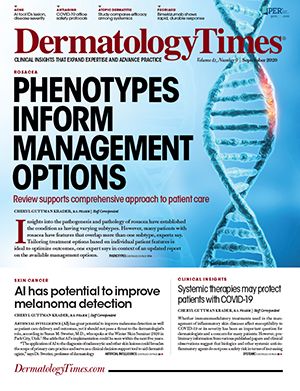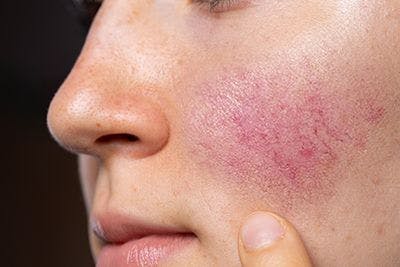- Acne
- Actinic Keratosis
- Aesthetics
- Alopecia
- Atopic Dermatitis
- Buy-and-Bill
- COVID-19
- Case-Based Roundtable
- Chronic Hand Eczema
- Drug Watch
- Eczema
- General Dermatology
- Hidradenitis Suppurativa
- Melasma
- NP and PA
- Pediatric Dermatology
- Pigmentary Disorders
- Practice Management
- Precision Medicine and Biologics
- Prurigo Nodularis
- Psoriasis
- Psoriatic Arthritis
- Rare Disease
- Rosacea
- Skin Cancer
- Vitiligo
- Wound Care
Publication
Article
Dermatology Times
Systemic immunomodulatory therapy may protect patients with COVID-19
Author(s):
Researchers at Mount Sinai Medical Center are investigating interactions between immunomodulatory treatments used to manage inflammatory skin diseases and the effects on patients with COVID-19.
Mount Sinai researchers aim to provide guidance using registry-based data
Whether immunomodulatory treatments used in the management of inflammatory skin diseases affect susceptibility to COVID-19 or its severity has been an important question for dermatologists and a concern for many patients. However, preliminary information from various published papers and clinical observations suggest that biologics and other systemic anti-inflammatory agents do not pose a safety risk in terms of increasing morbidity or mortality related to COVID-19. In fact, it appears that some medications may even have protective effects.
Through research she is leading at Mount Sinai Medical Center in New York, Emma Guttman-Yassky, M.D., Ph.D., hopes to provide more definitive insight on this topic.
Early in the pandemic, Dr. Guttman-Yassky and colleagues created a registry to collect data on COVID-19 in patients with eczema and psoriasis who have moderate to severe disease and are candidates for systemic treatments with anticipated funding from Regeneron and Sanofi.
In July, she received a grant from the National Institutes of Health (NIH) on behalf of the National Institute of Allergy and Infectious Disease to support some laboratory analyses of immune responses in blood of patients with eczema who had developed COVID-19.
Dr. Guttman-Yassky is the Sol and Clara Kest Professor of Dermatology and vice chair of the department of dermatology, Icahn School of Medicine at Mount Sinai. She tells Dermatology Times that with access to a large population of patients with inflammatory skin diseases on immunomodulatory treatment who became infected with COVID-19, her group is particularly well-positioned to investigate interactions between immunomodulatory treatment and the viral disease.
“The dermatology practices within the Mount Sinai Health System treat a huge number of patients with systemic medications for psoriasis and eczema. For example, we have more than 1,200 patients receiving dupilumab for moderate-to-severe eczema. Because New York City was an epicenter of the COVID-19 pandemic for some time, many of our patients were also affected by the coronavirus infection,” Dr. Guttman-Yassky explains.
“Considering our patient volume, we think our research will have sufficient power to identify associations if they exist and allow us to provide information that will be valuable for the entire dermatology community and our patients. Not only will it provide a foundation for developing a better treatment scheme for our patients with inflammatory skin diseases, but perhaps it may also suggest new approaches for treating COVID-19.”
The two-year grant from the NIH is in addition to a seven-year grant Dr. Guttman-Yassky was awarded previously to study mechanisms underlying variations in eczema phenotypes. The new grant supports determination of immune responses in blood collected from patients on systemic immunomodulatory treatment for eczema who developed COVID-19 and to detect potential treatment-related differences in mounting immune responses.
The idea that systemic immunomodulatory treatments -- and some biologic medications in particular -- may protect patients from becoming severely or critically ill with COVID-19 is based on information that a hyperinflammatory response that is characterized by elevated levels of various cytokines drives severity of the viral infection.
“One hypothesis that we will be testing is that biologic agents that target some immune axes may be protective,” Dr. Guttman-Yassky says.
Patients in the Mount Sinai dermatology registry are being asked to complete a questionnaire that identifies whether or not they developed COVID-19 or had exposure to anyone known to have the viral infection. Information on symptoms is gathered from patients with a confirmed diagnosis of COVID-19 so they can be categorized based on severity. Data are also being collected on comorbidities that are considered risk factors for COVID-19, including asthma, age, hypertension, diabetes, and ethnicity.
“Asthma is common in many patients with eczema, and hypertension and diabetes are both common among adults who have eczema or psoriasis. In addition, ethnic populations, including African Americans and Latinos, are more affected by severe eczema and have a higher prevalence of asthma, diabetes, and hypertension,” Dr. Guttman-Yassky said.
“Stratification of patients by COVID-19 risk factors will be important for investigating the effects of immunomodulatory treatments and differences in immunological responses to COVID-19.”

Newsletter
Like what you’re reading? Subscribe to Dermatology Times for weekly updates on therapies, innovations, and real-world practice tips.


























